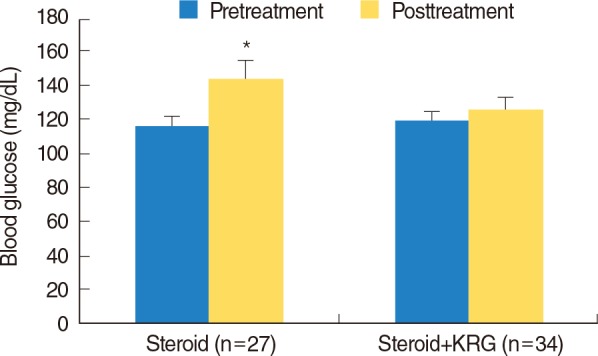Clin Exp Otorhinolaryngol.
2014 Sep;7(3):170-174. 10.3342/ceo.2014.7.3.170.
Effects of Korean Red Ginseng on Hearing and Blood Glucose Levels in Steroid Therapy for Sudden Sensorineural Hearing Loss
- Affiliations
-
- 1Department of Otorhinolaryngology-Head and Neck Surgery, The Catholic University of Korea College of Medicine, Seoul, Korea. khpent@catholic.ac.kr
- KMID: 1973465
- DOI: http://doi.org/10.3342/ceo.2014.7.3.170
Abstract
OBJECTIVES
Korean red ginseng (KRG) has hypoglycemic, antioxidant, antithrombotic, and other beneficial effects in human. The present study evaluate the therapeutic effects of KRG on hearing recovery and glucocorticoid-induced hyperglycemia in patients with idiopathic sudden sensorineural hearing loss (SSNHL) undergoing systemic steroid therapy.
METHODS
The patients were divided into 2 groups: the steroid, and the combination of steroid and red ginseng. Pure tone averages (PTA) were assessed at the first visit and 2-month follow-up. All patients underwent fasting blood glucose analyses just before and on the fifth day of treatment. Both groups were treated with a 10-day course of oral methylprednisolone at tapering doses starting from a daily dose of 48 mg. To the combination group, KRG extract was administered by mouth at a daily dose of 3 g for 20 days in addition to methylprednisolone. Hearing gain was calculated comparing the initial PTA and PTA at 2 months' follow-up. Treatment responses were classified according to Siegel's criteria.
RESULTS
Pretreatment conditions were similar between the steroid (n=37) and combination groups (n=36). At 2 months after the treatment, PTA improved significantly in both groups, but there was no significant difference in the mean hearing gain & recovery rate. The non-diabetic subjects in the steroid group (n=27) exhibited a 24% increase in the mean blood glucose level during the systemic steroid therapy, while those in the combination group (n=34) showed no changes.
CONCLUSION
Although the KRG did not provide greater therapeutic effects on hearing recovery, we suggest that red ginseng can be a useful adjuvant to the current steroid therapy to normalize glucocorticoid-induced hyperglycemia in non-diabetic patients during the treatment of SSNHL.
MeSH Terms
Figure
Reference
-
1. Im GJ, Chang JW, Choi J, Chae SW, Ko EJ, Jung HH. Protective effect of Korean red ginseng extract on cisplatin ototoxicity in HEI-OC1 auditory cells. Phytother Res. 2010; 4. 24(4):614–621. PMID: 20020438.
Article2. Choung YH, Kim SW, Tian C, Min JY, Lee HK, Park SN, et al. Korean red ginseng prevents gentamicin-induced hearing loss in rats. Laryngoscope. 2011; 6. 121(6):1294–1302. PMID: 21541943.
Article3. Tian C, Kim YH, Kim YC, Park KT, Kim SW, Kim YJ, et al. Korean red ginseng ameliorates acute 3-nitropropionic acid-induced cochlear damage in mice. Neurotoxicology. 2013; 1. 34:42–50. PMID: 23164932.
Article4. Fujita K, Hakuba N, Hata R, Morizane I, Yoshida T, Shudou M, et al. Ginsenoside Rb1 protects against damage to the spiral ganglion cells after cochlear ischemia. Neurosci Lett. 2007; 3. 415(2):113–117. PMID: 17296266.
Article5. Yu JY, Jin YR, Lee JJ, Chung JH, Noh JY, You SH, et al. Antiplatelet and antithrombotic activities of Korean Red Ginseng. Arch Pharm Res. 2006; 10. 29(10):898–903. PMID: 17121186.
Article6. Yun YP, Do JH, Ko SR, Ryu SY, Kim JH, Song HC, et al. Effects of Korean red ginseng and its mixed prescription on the high molecular weight dextran-induced blood stasis in rats and human platelet aggregation. J Ethnopharmacol. 2001; 10. 77(2-3):259–264. PMID: 11535373.
Article7. Barthel A, Scherbaum WA, Bornstein SR. Novel aspects in the mechanisms of steroid diabetes and the regulation of hepatic glucose production by insulin and steroids. Med Klin (Munich). 2003; 4. 98(5):283–286. PMID: 12721674.8. Kim HY, Kim K. Regulation of signaling molecules associated with insulin action, insulin secretion and pancreatic β-cell mass in the hypoglycemic effects of Korean red ginseng in Goto-Kakizaki rats. J Ethnopharmacol. 2012; 6. 142(1):53–58. PMID: 22543177.
Article9. De Souza LR, Jenkins AL, Sievenpiper JL, Jovanovski E, Rahelic D, Vuksan V. Korean red ginseng (Panax ginseng C.A. Meyer) root fractions: differential effects on postprandial glycemia in healthy individuals. J Ethnopharmacol. 2011; 9. 137(1):245–250. PMID: 21619921.
Article10. Hong YJ, Kim N, Lee K, Sonn CH, Lee JE, Kim ST, et al. Korean red ginseng (Panax ginseng) ameliorates type 1 diabetes and restores immune cell compartments. J Ethnopharmacol. 2012; 11. 144(2):225–233. PMID: 22925946.
Article11. Kim S, Shin BC, Lee MS, Lee H, Ernst E. Red ginseng for type 2 diabetes mellitus: a systematic review of randomized controlled trials. Chin J Integr Med. 2011; 12. 17(12):937–944. PMID: 22139546.
Article12. Rohrmeier C, Koemm N, Babilas P, Prahs P, Strutz J, Buettner R. Sudden sensorineural hearing loss: systemic steroid therapy and the risk of glucocorticoid-induced hyperglycemia. Eur Arch Otorhinolaryngol. 2013; 3. 270(4):1255–1261. PMID: 22843065.13. Siegel LG. The treatment of idiopathic sudden sensorineural hearing loss. Otolaryngol Clin North Am. 1975; 6. 8(2):467–473. PMID: 1153209.
Article14. Cheon SY, Cho KJ, Lee JE, Kim HW, Lee SK, Kim HJ, et al. Cerebroprotective effects of red ginseng extract pretreatment against ischemia-induced oxidative stress and apoptosis. Int J Neurosci. 2013; 4. 123(4):269–277. PMID: 23240589.
Article15. Ban JY, Kang SW, Lee JS, Chung JH, Ko YG, Choi HS. Korean red ginseng protects against neuronal damage induced by transient focal ischemia in rats. Exp Ther Med. 2012; 4. 3(4):693–698. PMID: 22969953.
Article16. Lee JS, Choi HS, Kang SW, Chung JH, Park HK, Ban JY, et al. Therapeutic effect of Korean red ginseng on inflammatory cytokines in rats with focal cerebral ischemia/reperfusion injury. Am J Chin Med. 2011; 39(1):83–94. PMID: 21213400.
Article
- Full Text Links
- Actions
-
Cited
- CITED
-
- Close
- Share
- Similar articles
-
- Intratympanic Steroid Therapy for Sudden Sensorineural Hearing Loss
- The Characteristics and the Changes of Tinnitus according to the Recovery of Hearing Loss in the Patients with Sudden Hearing Loss
- Sudden Sensorineural Hearing Loss after General Anesthesia: A case report
- A Case of Dolichoectasia of Vertebrobasilar Artery Presenting Simultaneous Bilateral Sudden Sensorineural Hearing Loss with Vertigo
- Hyperbaric Oxygen Therapy for Sudden Sensorineural Hearing Loss after Failure from Oral and Intratympanic Corticosteroid



